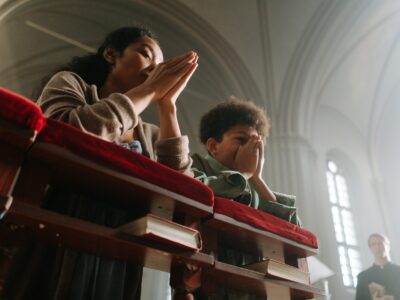As someone who didn’t grow up in a very religious home, there was no such thing as “Holy Week” in my life. If we went to church on Palm Sunday, I was delighted to wave a frond around and maybe glue a few popsicle sticks together to form a cross. Good Friday was the day we got off before spring break. Easter Sunday was for Easter baskets and Easter bunnies.
Oh, and the Easter sunrise service at our local church, where I stood in awe of creation first, and then the Creator, later.
Once I finally came around to God’s abundant love and grace for this silly little girl and all the rest of creation, I learned there’s a whole week of meaning leading up to the celebration of Jesus’ resurrection.
A whole week, and each day drenched with meaning!
If you’re like me and either grew up without a regular church tradition, or grew up in a “low church” Protestant space that didn’t place as much emphasis on holy days or holy weeks, then the concept of Easter Week might be foreign to you, too.
Holy Week is an opportunity to zoom in on the last days of Christ and reflect on his journey to the cross, his sacrifice, his death, and his resurrection. It all begins on Palm Sunday.
Palm Sunday
“The crowds that went ahead of him and those that followed shouted, ‘Hosanna to the Son of David!’ ‘Blessed is he who comes in the name of the Lord!’ ‘Hosanna in the highest heaven!'”
Matthew 21:9 (NIV)
Palm Sunday commemorates Jesus’ triumphal entry into Jerusalem, where crowds greeted him by waving palm branches and laying them on the ground before him. Many churches hold processions with palm branches.
The triumphal entry into Jerusalem seems like a happy occasion. The crowd thought that Jesus’ arrival meant that God’s kingdom and the city of Jerusalem would finally be reestablished outside of Roman rule. They thought he was the Messiah, sent to bring political power.
But the kingdom Jesus ushered in was greater even than this… and not at all what the people expected.
Holy Monday
“Then he entered the temple area and began driving out those who were selling. ‘It is written,’ he said to them, ‘My house will be a house of prayer’; but you have made it ‘a den of robbers.'”
Luke 19:45-46 NIV
Like I said, Jesus’ arrival in Jerusalem wasn’t exactly what the people expected.
Holy Monday is a day of reflection on Jesus’ actions during his final week. The Eastern Orthodox Church commemorates the day with Bible readings that focus on Jesus cleansing the temple or his teachings in Jerusalem.
Holy Tuesday
“Therefore I tell you that the kingdom of God will be taken away from you and given to a people who will produce its fruit. Anyone who falls on this stone will be broken to pieces; anyone on whom it falls will be crushed.” When the chief priests and the Pharisees heard Jesus’ parables, they knew he was talking about them. They looked for a way to arrest him, but they were afraid of the crowd because the people held that he was a prophet.
Matthew 21:43-46 NIV
Holy Tuesday is often associated with the parables and teachings of Jesus, particularly those that challenged the religious authorities, which Jesus did quite a bit.
Some churches hold services focusing on Jesus’ predictions of his impending death and his teachings on love and forgiveness.
Holy Wednesday (Spy Wednesday):
“Then Judas Iscariot, one of the Twelve, went to the chief priests to betray Jesus to them. They were delighted to hear this and promised to give him money. So he watched for an opportunity to hand him over.”
Mark 14:10-11 NIV
Holy Wednesday is traditionally associated with the betrayal of Jesus by Judas Iscariot, often referred to as “Spy Wednesday.”
Maundy Thursday
Maundy Thursday commemorates the Last Supper of Jesus with his disciples. “Maundy” comes from the Latin word “mandatum,” meaning commandment. It refers to the commandment Jesus gave to his disciples at the Last Summer:
“A new command I give you: Love one another. As I have loved you, so you must love one another. By this everyone will know that you are my disciples, if you love one another.”
John 13:34-35 NIV
Maundy Thursday is also the day that celebrates Jesus’ teaching about communion, or the Eucharist. And at the Last Supper, Jesus washed the feet of his disciples, symbolically communicating the way we are supposed to serve each other.
My tradition—the Brethren—hold a special three-fold communion on Maundy Thursday, celebrating a “love feast” (a big dinner with other followers of Jesus), washing each other’s feet, and taking the bread and the cup together.
Good Friday
“But he was pierced for our transgressions, he was crushed for our iniquities; the punishment that brought us peace was on him, and by his wounds, we are healed.”
Isaiah 53:5 NIV
Okay, now we’re getting onto more familiar ground, right? It’s spring break! 🙂
Just kidding. Sorry to rain on your parade, kiddo, but Good Friday is the most solemn day of Holy Week, commemorating the crucifixion and death of Jesus.
Many Christians observe fasts and attend special church services, some will carry wooden crosses around town, others will use the Stations of the Cross to reflect on Jesus’ journey to the cross and the suffering he underwent, and all include some reading of the Passion narrative.
Good Friday is “good” because of Jesus’ willingness to suffer and die on behalf of all of humanity, for our salvation and redemption.
Sorrows may last for the night, but hope comes in the morning…
Holy Saturday (Black Saturday)
“But God raised him from the dead, freeing him from the agony of death, because it was impossible for death to keep its hold on him.”
Acts 2:24 NIV
Good Friday might be the most solemn day of Holy Week, but for me, I think Holy Saturday is the darkest. It is the in-between, the day after death. Darkness settles into our hearts. All hope feels lost.
Because we know what comes next, Holy Saturday is a day of waiting and anticipation.
Some churches hold Easter Vigil services after sundown, which mark the transition from darkness to light and celebrate the resurrection of Jesus. The Easter Vigil often includes the lighting of the Paschal candle, readings from the Old and New Testaments, baptisms, and the first celebration of the Eucharist of Easter.
Easter Sunday
“But Christ has indeed been raised from the dead, the firstfruits of those who have fallen asleep. For since death came through a man, the resurrection of the dead comes also through a man. For as in Adam all die, so in Christ, all will be made alive.”
1 Corinthians 15:20-22 NIV
Praise Jesus, we’ve arrived on Easter Sunday!
Easter Sunday celebrates the resurrection of Jesus from the dead, that glorious, life-changing, history-making moment when Jesus conquered sin and death, waking us up to the New Creation and abundant life.
Easter Sunday mornings across the globe, churches hold joyful services with special music and hymns, they ring the bells, they decorate their churches with Easter lilies, they share an Easter meal with family and friends.
Easter Sunday marks the truth of our freedom in Christ: that there is hope and restoration for every soul who turns her face to God and believes in that unconditional love that saves.
Christos Anesti! Christ is risen! He is risen indeed!





 Copyright
2024
Root and Vine
Copyright
2024
Root and Vine